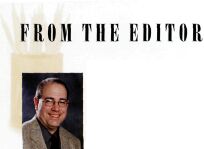 |
Home | Search | Browse | About IPO | Staff | Links |
 |
Home | Search | Browse | About IPO | Staff | Links |
 January is the time for looking forward. But in 2007, I am looking forward to looking backward.
January is the time for looking forward. But in 2007, I am looking forward to looking backward.
One project on the horizon at IAPD is publishing a book on the history and significance of park, recreation and conservation agencies in Illinois. We'll be asking your agency to share photos and memories for this volume. History, I suppose, can be a guide to the future. I find, however, that the histories of things - battles, wars, ideas, institutions -- however pleasant and important they may be, are rarely vibrant touchstones for the issues at hand. Often, in a quest to economically record sequences of essential facts, books make history sound too neatly predetermined: an unbroken string of timely and successful gestures. I promise that IAPD's history of parks, recreation and conservation agencies in our state will seek to avoid that. Still, the history I often need is mote utilitarian. It's the kind most often categorized as institutional memory. It's the kind that comes in answers to such questions as: "What's the best way to approach the board with this proposal?" or "Why are the fees structured that way?" or "When is the best time to make sure members of the General Assembly get these new position papers?" Failed policies, personal histories, procedural nuances and the million other little things that, in and of themselves, appear too insignificant to be written down are the stuff of the institutional memories that reside in the heads of our seasoned coworkers. And that's why I often learn more over an hour with the staff at the IAPD lunch table than I do banging away in my office all morning. The problem is that institutional memories walk out the door each evening. And, some day, they won't walk back in. When you flip to the People and Places section of each issue of IP&R, this is the real story behind the retirement notices you see. The people who leave agencies often leave us without the on-demand, friendly sages we have relied on. The world of work thus becomes something like a perversely structured school where the best teachers graduate and the students are left to fend for themselves. At IAPD, we find ourselves in that situation. In December, Development Director John Comcrio left the association. His original plans were to retire, or at least work less. But I don't think the profession will let John Comerio go that easily. John was with the association only seven years, but he has been a part of the Illinois park, recreation and conservation story for nearly 40. He came to IAPD after working 30 years for the Illinois Department of Conservation, which became part of the Illinois Department of Natural Resources, the agency for which he served as deputy director for eight years. From long experience, John knows how the constituencies that make up the Illinois park, recreation and conservation community work. To put it delicately (though a lot less delicately than he himself could) when the system failed, John knew what gears were likely to have gotten gummed up, and he often knew where to apply the grease. His advice was most often wise and was always offered with kindness and graciousness. As a friend and IAPD coworker, I counted on him and looked up to him, and in that I know I am not alone. In 2007, 1 hope that at your agency you renew your appreciation of your institutional memories and, most especially, I hope you more deeply admire the keepers of them.
RODD WHELPLEY |
|
|